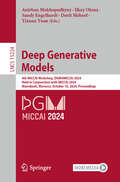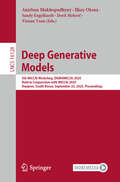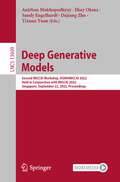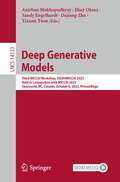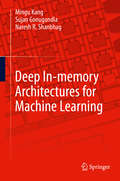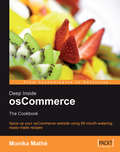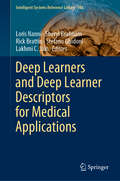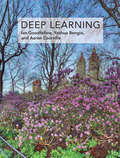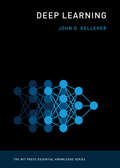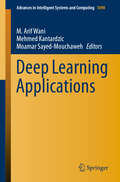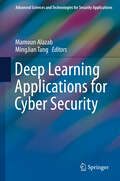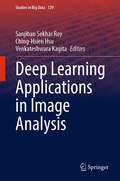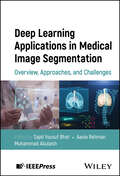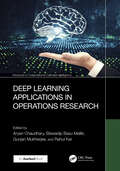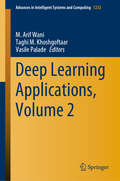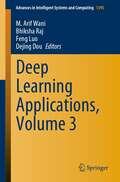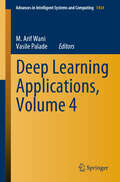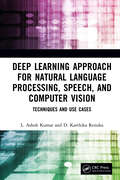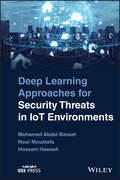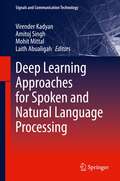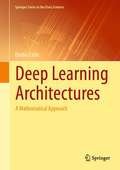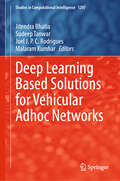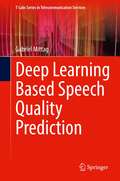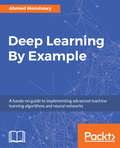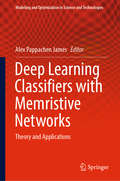- Table View
- List View
Deep Generative Models: 4th MICCAI Workshop, DGM4MICCAI 2024, Held in Conjunction with MICCAI 2024, Marrakesh, Morocco, October 10, 2024, Proceedings (Lecture Notes in Computer Science #15224)
by Anirban Mukhopadhyay Sandy Engelhardt Ilkay Oksuz Yixuan Yuan Dorit MehrofThis book constitutes the proceedings of the 4th workshop on Deep Generative Models for Medical Image Computing and Computer Assisted Intervention, DGM4MICCAI 2024, held in conjunction with the 27th International conference on Medical Image Computing and Computer Assisted Intervention, MICCAI 2024, in Marrakesh, Morocco in October 2024. The 21 papers presented here were carefully reviewed and selected from 40 submissions. These papers deal with a broad range of topics, ranging from methodology (such as Causal inference, Latent interpretation, Generative factor analysis) to Applications (such as Mammography, Vessel imaging, Surgical videos and more).
Deep Generative Models: 5th MICCAI Workshop, DGM4MICCAI 2025, Held in Conjunction with MICCAI 2025, Daejeon, South Korea, September 23, 2025, Proceedings (Lecture Notes in Computer Science #16128)
by Anirban Mukhopadhyay Sandy Engelhardt Ilkay Oksuz Yixuan Yuan Dorit MehrofThis book constitutes the proceedings of the 5th Workshop on Deep Generative Models for Medical Image Computing and Computer Assisted Intervention, DGM4MICCAI 2025, held in conjunction with the 28th International Conference on Medical Image Computing and Computer Assisted Intervention, MICCAI 2025, in Daejeon, South Korea, during September 2025.The 33 papers presented in this book were carefully reviewed and selected from 50 submissions. These papers deal with recent algorithmic developments, new results, and promising future directions in Deep Generative Models.
Deep Generative Models: Second MICCAI Workshop, DGM4MICCAI 2022, Held in Conjunction with MICCAI 2022, Singapore, September 22, 2022, Proceedings (Lecture Notes in Computer Science #13609)
by Anirban Mukhopadhyay Dajiang Zhu Sandy Engelhardt Ilkay Oksuz Yixuan YuanThis book constitutes the refereed proceedings of the Second MICCAI Workshop on Deep Generative Models, DG4MICCAI 2022, held in conjunction with MICCAI 2022, in September 2022. The workshops took place in Singapore. DG4MICCAI 2022 accepted 12 papers from the 15 submissions received. The workshop focusses on recent algorithmic developments, new results, and promising future directions in Deep Generative Models. Deep generative models such as Generative Adversarial Network (GAN) and Variational Auto-Encoder (VAE) are currently receiving widespread attention from not only the computer vision and machine learning communities, but also in the MIC and CAI community.
Deep Generative Models: Third MICCAI Workshop, DGM4MICCAI 2023, Held in Conjunction with MICCAI 2023, Vancouver, BC, Canada, October 8, 2023, Proceedings (Lecture Notes in Computer Science #14533)
by Anirban Mukhopadhyay Dajiang Zhu Sandy Engelhardt Ilkay Oksuz Yixuan YuanThis LNCS conference volume constitutes the proceedings of the third MICCAI Workshop, DGM4MICCAI 2023, Held in Conjunction with MICCAI 2023, Vancouver, BC, Canada, October 2023. The 23 full papers included in this volume were carefully reviewed and selected from 38 submissions.The conference presents topics ranging from methodology, causal inference, latent interpretation, generative factor analysis to applications such as mammography, vessel imaging, and surgical Videos.
Deep In-memory Architectures for Machine Learning
by Mingu Kang Sujan Gonugondla Naresh R. ShanbhagThis book describes the recent innovation of deep in-memory architectures for realizing AI systems that operate at the edge of energy-latency-accuracy trade-offs. From first principles to lab prototypes, this book provides a comprehensive view of this emerging topic for both the practicing engineer in industry and the researcher in academia. The book is a journey into the exciting world of AI systems in hardware.
Deep Inside osCommerce: The Cookbook
by Monika MathéThis book is aimed at people with existing online stores, built using osCommerce. The book follows a systematic approach whereby users can modify and extend features on their already existing osCommerce site. Each chapter deals with a different aspect , and provides ready-made recipes for modifying code to your requirements. The author starts by explaining basic changes one can make to the design of your store, and then covers features like navigation, images, shipping and payment modules, and even explains how to make changes on the administratorâ TMs side and keeping your own recipes private. This book is for people who are already familiar with osCommerce. It presumes a working knowledge of PHP and HTML, as well as basic understanding of phpMyAdmin for database inserts.
Deep Learners and Deep Learner Descriptors for Medical Applications (Intelligent Systems Reference Library #186)
by Lakhmi C. Jain Sheryl Brahnam Loris Nanni Stefano Ghidoni Rick BrattinThis book introduces readers to the current trends in using deep learners and deep learner descriptors for medical applications. It reviews the recent literature and presents a variety of medical image and sound applications to illustrate the five major ways deep learners can be utilized: 1) by training a deep learner from scratch (chapters provide tips for handling imbalances and other problems with the medical data); 2) by implementing transfer learning from a pre-trained deep learner and extracting deep features for different CNN layers that can be fed into simpler classifiers, such as the support vector machine; 3) by fine-tuning one or more pre-trained deep learners on an unrelated dataset so that they are able to identify novel medical datasets; 4) by fusing different deep learner architectures; and 5) by combining the above methods to generate a variety of more elaborate ensembles. This book is a value resource for anyone involved in engineering deep learners for medical applications as well as to those interested in learning more about the current techniques in this exciting field. A number of chapters provide source code that can be used to investigate topics further or to kick-start new projects.
Deep Learning (Adaptive Computation and Machine Learning series)
by Ian Goodfellow Yoshua Bengio Aaron CourvilleAn introduction to a broad range of topics in deep learning, covering mathematical and conceptual background, deep learning techniques used in industry, and research perspectives.“Written by three experts in the field, Deep Learning is the only comprehensive book on the subject.”—Elon Musk, cochair of OpenAI; cofounder and CEO of Tesla and SpaceXDeep learning is a form of machine learning that enables computers to learn from experience and understand the world in terms of a hierarchy of concepts. Because the computer gathers knowledge from experience, there is no need for a human computer operator to formally specify all the knowledge that the computer needs. The hierarchy of concepts allows the computer to learn complicated concepts by building them out of simpler ones; a graph of these hierarchies would be many layers deep. This book introduces a broad range of topics in deep learning. The text offers mathematical and conceptual background, covering relevant concepts in linear algebra, probability theory and information theory, numerical computation, and machine learning. It describes deep learning techniques used by practitioners in industry, including deep feedforward networks, regularization, optimization algorithms, convolutional networks, sequence modeling, and practical methodology; and it surveys such applications as natural language processing, speech recognition, computer vision, online recommendation systems, bioinformatics, and videogames. Finally, the book offers research perspectives, covering such theoretical topics as linear factor models, autoencoders, representation learning, structured probabilistic models, Monte Carlo methods, the partition function, approximate inference, and deep generative models. Deep Learning can be used by undergraduate or graduate students planning careers in either industry or research, and by software engineers who want to begin using deep learning in their products or platforms. A website offers supplementary material for both readers and instructors.
Deep Learning (The MIT Press Essential Knowledge series)
by John D. KelleherAn accessible introduction to the artificial intelligence technology that enables computer vision, speech recognition, machine translation, and driverless cars.Deep learning is an artificial intelligence technology that enables computer vision, speech recognition in mobile phones, machine translation, AI games, driverless cars, and other applications. When we use consumer products from Google, Microsoft, Facebook, Apple, or Baidu, we are often interacting with a deep learning system. In this volume in the MIT Press Essential Knowledge series, computer scientist John Kelleher offers an accessible and concise but comprehensive introduction to the fundamental technology at the heart of the artificial intelligence revolution.Kelleher explains that deep learning enables data-driven decisions by identifying and extracting patterns from large datasets; its ability to learn from complex data makes deep learning ideally suited to take advantage of the rapid growth in big data and computational power. Kelleher also explains some of the basic concepts in deep learning, presents a history of advances in the field, and discusses the current state of the art. He describes the most important deep learning architectures, including autoencoders, recurrent neural networks, and long short-term networks, as well as such recent developments as Generative Adversarial Networks and capsule networks. He also provides a comprehensive (and comprehensible) introduction to the two fundamental algorithms in deep learning: gradient descent and backpropagation. Finally, Kelleher considers the future of deep learning—major trends, possible developments, and significant challenges.
Deep Learning Applications (Advances in Intelligent Systems and Computing #1098)
by Moamar Sayed-Mouchaweh Mehmed Kantardzic M. Arif WaniThis book presents a compilation of selected papers from the 17th IEEE International Conference on Machine Learning and Applications (IEEE ICMLA 2018), focusing on use of deep learning technology in application like game playing, medical applications, video analytics, regression/classification, object detection/recognition and robotic control in industrial environments. It highlights novel ways of using deep neural networks to solve real-world problems, and also offers insights into deep learning architectures and algorithms, making it an essential reference guide for academic researchers, professionals, software engineers in industry, and innovative product developers.
Deep Learning Applications for Cyber Security (Advanced Sciences and Technologies for Security Applications)
by Mamoun Alazab MingJian TangCybercrime remains a growing challenge in terms of security and privacy practices. Working together, deep learning and cyber security experts have recently made significant advances in the fields of intrusion detection, malicious code analysis and forensic identification. This book addresses questions of how deep learning methods can be used to advance cyber security objectives, including detection, modeling, monitoring and analysis of as well as defense against various threats to sensitive data and security systems. Filling an important gap between deep learning and cyber security communities, it discusses topics covering a wide range of modern and practical deep learning techniques, frameworks and development tools to enable readers to engage with the cutting-edge research across various aspects of cyber security. The book focuses on mature and proven techniques, and provides ample examples to help readers grasp the key points.
Deep Learning Applications in Image Analysis (Studies in Big Data #129)
by Ching-Hsien Hsu Sanjiban Sekhar Roy Venkateshwara KagitaThis book provides state-of-the-art coverage of deep learning applications in image analysis. The book demonstrates various deep learning algorithms that can offer practical solutions for various image-related problems; also how these algorithms are used by scientists and scholars in industry and academia. This includes autoencoder and deep convolutional generative adversarial network in improving classification performance of Bangla handwritten characters, dealing with deep learning-based approaches using feature selection methods for automatic diagnosis of covid-19 disease from x-ray images, imbalance image data sets of classification, image captioning using deep transfer learning, developing a vehicle over speed detection system, creating an intelligent system for video-based proximity analysis, building a melanoma cancer detection system using deep learning, plant diseases classification using AlexNet, dealing with hyperspectral images using deep learning, chest x-ray image classification of pneumonia disease using efficient net and inceptionv3.The book also addresses the difficulty of implementing deep learning in terms of computation time and the complexity of reasoning and modelling different types of data where information is currently encoded. Each chapter has the application of various new or existing deep learning models such as Deep Neural Network (DNN) and Deep Convolutional Neural Networks (DCNN). The detailed utilization of deep learning packages that are available in MATLAB, Python and R programming environments have also been discussed, therefore, the readers will get to know about the practical implementation of deep learning as well. The content of this book is presented in a simple and lucid style for professionals, nonprofessionals, scientists, and students interested in the research area of deep learning applications in image analysis.
Deep Learning Applications in Medical Image Segmentation: Overview, Approaches, and Challenges
by Sajid Yousuf Bhat Aasia Rehman Muhammad AbulaishApply revolutionary deep learning technology to the fast-growing field of medical image segmentation Precise medical image segmentation is rapidly becoming one of the most important tools in medical research, diagnosis, and treatment. The potential for deep learning, a technology which is already revolutionizing practice across hundreds of subfields, is immense. The prospect of using deep learning to address the traditional shortcomings of image segmentation demands close inspection and wide proliferation of relevant knowledge. Deep Learning Applications in Medical Image Segmentation meets this demand with a comprehensive introduction and its growing applications. Covering foundational concepts and its advanced techniques, it offers a one-stop resource for researchers and other readers looking for a detailed understanding of the topic. It is deeply engaged with the main challenges and recent advances in the field of deep-learning-based medical image segmentation. Readers will also find: Analysis of deep learning models, including FCN, UNet, SegNet, Dee Lab, and many moreDetailed discussion of medical image segmentation divided by area, incorporating all major organs and organ systemsRecent deep learning advancements in segmenting brain tumors, retinal vessels, and inner ear structuresAnalyzes the effectiveness of deep learning models in segmenting lung fields for respiratory disease diagnosisExplores the application and benefits of Generative Adversarial Networks (GANs) in enhancing medical image segmentationIdentifies and discusses the key challenges faced in medical image segmentation using deep learning techniquesProvides an overview of the latest advancements, applications, and future trends in deep learning for medical image analysis Deep Learning Applications in Medical Image Segmentation is ideal for academics and researchers working with medical image segmentation, as well as professionals in medical imaging, data science, and biomedical engineering.
Deep Learning Applications in Operations Research (Advances in Computational Collective Intelligence)
by Gunjan Mukherjee Aryan Chaudhary Biswadip Basu Mallik Rahul KarThe model-based approach for carrying out the classification and identification of tasks has led to progression of the machine learning paradigm in diversified fields of technology. Deep Learning Applications in Operations Research presents the varied applications of this model-based approach. Apart from the classification process, the machine learning (ML) model has become effective enough to predict future trends of any sort of phenomenon. Such fields as object classification, speech recognition, and face detection have sought extensive applications of artificial intelligence (AI) and machine learning as well. The application of AI and ML has also become increasingly common in the domains of agriculture, health sectors, and insurance.Operations research is the branch of mathematics used to perform many operational tasks in other allied domains, and the book explains how the implementation of automated strategies in optimization and parameter selection can be carried out by AI and ML. Operations research has many beneficial aspects to aid in decision making. Arriving at the proper decision depends on a number of factors; this book examines how AI and ML can be used to model equations and define constraints to solve problems more easily and discover proper and valid solutions. This book also looks at how automation plays a significant role in minimizing human labor and thereby minimizes overall time and cost. Case studies examine how to streamline operations and unearth data to make better business decisions. The concepts presented in this book can bring about and guide unique research directions to the future application of AI-enabled technologies.
Deep Learning Applications, Volume 2 (Advances in Intelligent Systems and Computing #1232)
by Vasile Palade M. Arif Wani Taghi M. KhoshgoftaarThis book presents selected papers from the 18th IEEE International Conference on Machine Learning and Applications (IEEE ICMLA 2019). It focuses on deep learning networks and their application in domains such as healthcare, security and threat detection, fault diagnosis and accident analysis, and robotic control in industrial environments, and highlights novel ways of using deep neural networks to solve real-world problems. Also offering insights into deep learning architectures and algorithms, it is an essential reference guide for academic researchers, professionals, software engineers in industry, and innovative product developers.
Deep Learning Applications, Volume 3 (Advances in Intelligent Systems and Computing #1395)
by Bhiksha Raj Dejing Dou M. Arif Wani Feng LuoThis book presents a compilation of extended version of selected papers from the 19th IEEE International Conference on Machine Learning and Applications (IEEE ICMLA 2020) and focuses on deep learning networks in applications such as pneumonia detection in chest X-ray images, object detection and classification, RGB and depth image fusion, NLP tasks, dimensionality estimation, time series forecasting, building electric power grid for controllable energy resources, guiding charities in maximizing donations, and robotic control in industrial environments. Novel ways of using convolutional neural networks, recurrent neural network, autoencoder, deep evidential active learning, deep rapid class augmentation techniques, BERT models, multi-task learning networks, model compression and acceleration techniques, and conditional Feature Augmented and Transformed GAN (cFAT-GAN) for the above applications are covered in this book. Readers will find insights to help them realize novel ways of using deep learning architectures and algorithms in real-world applications and contexts, making the book an essential reference guide for academic researchers, professionals, software engineers in the industry, and innovative product developers.
Deep Learning Applications, Volume 4 (Advances in Intelligent Systems and Computing #1434)
by Vasile Palade M. Arif WaniThis book presents a compilation of extended versions of selected papers from 20th IEEE International Conference on Machine Learning and Applications (IEEE ICMLA 2021). It focuses on deep learning networks and their applications in domains such as healthcare, security and threat detection, fault diagnosis and accident analysis, and robotic control in industrial environments. It highlights novel ways of using deep neural networks to solve real-world problems, and also offers insights into deep learning architectures and algorithms, making it an essential reference guide for academic researchers, professionals, software engineers in industry, and innovative product developers. The book is fourth in the series published since 2017.
Deep Learning Approach for Natural Language Processing, Speech, and Computer Vision: Techniques and Use Cases
by L. Ashok Kumar D. Karthika RenukaDeep Learning Approach for Natural Language Processing, Speech, and Computer Vision provides an overview of general deep learning methodology and its applications of natural language processing (NLP), speech, and computer vision tasks. It simplifies and presents the concepts of deep learning in a comprehensive manner, with suitable, full-fledged examples of deep learning models, with an aim to bridge the gap between the theoretical and the applications using case studies with code, experiments, and supporting analysis. Features: Covers latest developments in deep learning techniques as applied to audio analysis, computer vision, and natural language processing. Introduces contemporary applications of deep learning techniques as applied to audio, textual, and visual processing. Discovers deep learning frameworks and libraries for NLP, speech, and computer vision in Python. Gives insights into using the tools and libraries in Python for real-world applications. Provides easily accessible tutorials and real-world case studies with code to provide hands-on experience. This book is aimed at researchers and graduate students in computer engineering, image, speech, and text processing.
Deep Learning Approaches for Security Threats in IoT Environments
by Nour Moustafa Mohamed Abdel-Basset Hossam HawashDeep Learning Approaches for Security Threats in IoT Environments An expert discussion of the application of deep learning methods in the IoT security environment In Deep Learning Approaches for Security Threats in IoT Environments, a team of distinguished cybersecurity educators deliver an insightful and robust exploration of how to approach and measure the security of Internet-of-Things (IoT) systems and networks. In this book, readers will examine critical concepts in artificial intelligence (AI) and IoT, and apply effective strategies to help secure and protect IoT networks. The authors discuss supervised, semi-supervised, and unsupervised deep learning techniques, as well as reinforcement and federated learning methods for privacy preservation. This book applies deep learning approaches to IoT networks and solves the security problems that professionals frequently encounter when working in the field of IoT, as well as providing ways in which smart devices can solve cybersecurity issues. Readers will also get access to a companion website with PowerPoint presentations, links to supporting videos, and additional resources. They’ll also find: A thorough introduction to artificial intelligence and the Internet of Things, including key concepts like deep learning, security, and privacy Comprehensive discussions of the architectures, protocols, and standards that form the foundation of deep learning for securing modern IoT systems and networks In-depth examinations of the architectural design of cloud, fog, and edge computing networks Fulsome presentations of the security requirements, threats, and countermeasures relevant to IoT networks Perfect for professionals working in the AI, cybersecurity, and IoT industries, Deep Learning Approaches for Security Threats in IoT Environments will also earn a place in the libraries of undergraduate and graduate students studying deep learning, cybersecurity, privacy preservation, and the security of IoT networks.
Deep Learning Approaches for Spoken and Natural Language Processing (Signals and Communication Technology)
by Amitoj Singh Virender Kadyan Mohit Mittal Laith AbualigahThis book provides insights into how deep learning techniques impact language and speech processing applications. The authors discuss the promise, limits and the new challenges in deep learning. The book covers the major differences between the various applications of deep learning and the classical machine learning techniques. The main objective of the book is to present a comprehensive survey of the major applications and research oriented articles based on deep learning techniques that are focused on natural language and speech signal processing. The book is relevant to academicians, research scholars, industrial experts, scientists and post graduate students working in the field of speech signal and natural language processing and would like to add deep learning to enhance capabilities of their work.Discusses current research challenges and future perspective about how deep learning techniques can be applied to improve NLP and speech processing applications;Presents and escalates the research trends and future direction of language and speech processing;Includes theoretical research, experimental results, and applications of deep learning.
Deep Learning Architectures: A Mathematical Approach (Springer Series in the Data Sciences)
by Ovidiu CalinThis book describes how neural networks operate from the mathematical point of view. As a result, neural networks can be interpreted both as function universal approximators and information processors. The book bridges the gap between ideas and concepts of neural networks, which are used nowadays at an intuitive level, and the precise modern mathematical language, presenting the best practices of the former and enjoying the robustness and elegance of the latter.This book can be used in a graduate course in deep learning, with the first few parts being accessible to senior undergraduates. In addition, the book will be of wide interest to machine learning researchers who are interested in a theoretical understanding of the subject.
Deep Learning Based Solutions for Vehicular Adhoc Networks (Studies in Computational Intelligence #1207)
by Sudeep Tanwar Joel J. P. C. Rodrigues Jitendra Bhatia Malaram KumharThis book provides a holistic and comprehensive approach to deep learning for vehicular ad hoc networks (VANETs), covering various aspects such as applications, agency involvement, and potential ethical and legal issues. It begins with discussions on how the transportation system has been converted into Intelligent Transportation System (ITS). The use of VANETs is increasing in the development of ITS to enhance road safety, traffic efficiency, and driver comfort. However, the dynamic nature of vehicular environments and the high mobility of vehicles pose significant challenges to designing and implementing VANETs and ensuring reliable and efficient communication. Deep learning, a subset of machine learning, has the potential to revolutionize vehicular ad hoc networks (VANETs) to enable various applications such as traffic management, collision avoidance, and infotainment. DL has demonstrated great potential in addressing various challenges involved in VANETs by leveraging its ability to learn from vast data and make accurate predictions. It reviews the state-of-the-art DL-based approaches for various applications in VANETs, including routing, congestion control, autonomous driving, and security. In addition, this book provides a comprehensive analysis of these approaches' advantages and limitations and discusses their future research directions. The study in this book shows that DL-based techniques can significantly improve the performance and reliability of VANETs. Still, in-depth research is required to address the challenges of deploying these methods in real-world scenarios. Finally, the book discusses the potential of DL-based VANETs in supporting other emerging technologies, such as autonomous driving and smart cities. It explores the simulation/emulation tools for practical exposure to the vehicular ad hoc network.
Deep Learning Based Speech Quality Prediction (T-Labs Series in Telecommunication Services)
by Gabriel MittagThis book presents how to apply recent machine learning (deep learning) methods for the task of speech quality prediction. The author shows how recent advancements in machine learning can be leveraged for the task of speech quality prediction and provides an in-depth analysis of the suitability of different deep learning architectures for this task. The author then shows how the resulting model outperforms traditional speech quality models and provides additional information about the cause of a quality impairment through the prediction of the speech quality dimensions of noisiness, coloration, discontinuity, and loudness.
Deep Learning By Example: A hands-on guide to implementing advanced machine learning algorithms and neural networks
by Ahmed MenshawyGrasp the fundamental concepts of deep learning using Tensorflow in a hands-on manner About This Book • Get a first-hand experience of the deep learning concepts and techniques with this easy-to-follow guide • Train different types of neural networks using Tensorflow for real-world problems in language processing, computer vision, transfer learning, and more • Designed for those who believe in the concept of 'learn by doing', this book is a perfect blend of theory and code examples Who This Book Is For This book targets data scientists and machine learning developers who wish to get started with deep learning. If you know what deep learning is but are not quite sure of how to use it, this book will help you as well. An understanding of statistics and data science concepts is required. Some familiarity with Python programming will also be beneficial. What You Will Learn • Understand the fundamentals of deep learning and how it is different from machine learning • Get familiarized with Tensorflow, one of the most popular libraries for advanced machine learning • Increase the predictive power of your model using feature engineering • Understand the basics of deep learning by solving a digit classification problem of MNIST • Demonstrate face generation based on the CelebA database, a promising application of generative models • Apply deep learning to other domains like language modeling, sentiment analysis, and machine translation In Detail Deep learning is a popular subset of machine learning, and it allows you to build complex models that are faster and give more accurate predictions. This book is your companion to take your first steps into the world of deep learning, with hands-on examples to boost your understanding of the topic. This book starts with a quick overview of the essential concepts of data science and machine learning which are required to get started with deep learning. It introduces you to Tensorflow, the most widely used machine learning library for training deep learning models. You will then work on your first deep learning problem by training a deep feed-forward neural network for digit classification, and move on to tackle other real-world problems in computer vision, language processing, sentiment analysis, and more. Advanced deep learning models such as generative adversarial networks and their applications are also covered in this book. By the end of this book, you will have a solid understanding of all the essential concepts in deep learning. With the help of the examples and code provided in this book, you will be equipped to train your own deep learning models with more confidence. Style and approach A step-by-step guide filled with multiple examples to help you get started with data science and deep learning.
Deep Learning Classifiers with Memristive Networks: Theory and Applications (Modeling and Optimization in Science and Technologies #14)
by Alex Pappachen JamesThis book introduces readers to the fundamentals of deep neural network architectures, with a special emphasis on memristor circuits and systems. At first, the book offers an overview of neuro-memristive systems, including memristor devices, models, and theory, as well as an introduction to deep learning neural networks such as multi-layer networks, convolution neural networks, hierarchical temporal memory, and long short term memories, and deep neuro-fuzzy networks. It then focuses on the design of these neural networks using memristor crossbar architectures in detail. The book integrates the theory with various applications of neuro-memristive circuits and systems. It provides an introductory tutorial on a range of issues in the design, evaluation techniques, and implementations of different deep neural network architectures with memristors.
